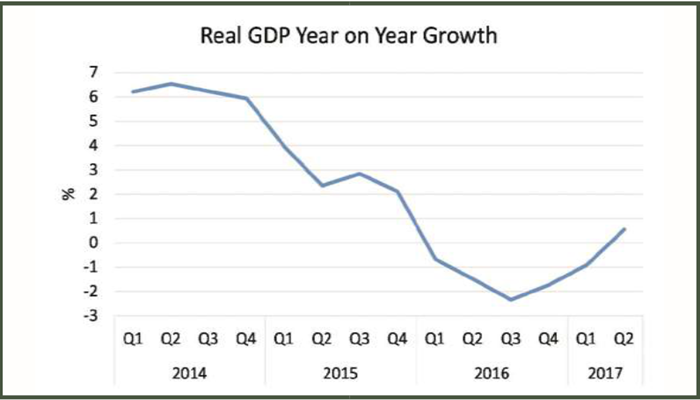
…but recovery weak- Expert
The Nigerian Bureau of statistics (NBS) said on Tuesday in its Q2 GDP report that Nigeria’s economy has emerged from recession in the second quarter, expanding 0.55 per cent year-on-year.
The country’s economy shrank by 1.5 per cent in 2016 for its first annual contraction in 25 years. It also declined in the first quarter of this year, due to lower revenues from oil, its dominant export, and a shortage of hard currency.
Crude production slumped last year as militants attacked oil facilities. It recovered in the second quarter to 1.84 million barrels per day, the statistics office said on its Twitter account, after the government engaged in negotiations to address communities’ grievances in its crude-producing heartlands in the Niger Delta.
This growth, according to the NBS is 2.04 per cent higher than the rate recorded in the corresponding quarter of 2016 (–1.49%) and higher by 1.46 per cent points from rate recorded in the preceding quarter, (revised to –0.91% from –0.52%).
It said quarter-on-quarter, real GDP growth was 3.23 per cent. During the quarter, aggregate GDP stood at N26,986,005.20 million in nominal terms, compared to N23,547,466.91 million in Q2 2016, resulting in a nominal GDP growth of 14.60 per cent.
During the review period, oil production is estimated to have averaged at 1.84 million barrels per day (mbpd), 0.15 million barrels higher than the daily average production recorded in the first quarter of 2017 (June 2017 is estimated and may be revised).
Oil production during the quarter was higher by 0.03 million barrels per day relative to the corresponding quarter in 2016, which recorded an output of 1.81mbpd.
NBS explained that oil output for March 2017 has been revised and this affected average output for the first quarter 2017 from 1.83mbpd to 1.69mbpd.
The non-oil sector grew by 0.45 per cent in real terms during the reference quarter. Also, the major driver of growth in the Non-oil sector was the Agriculture Sector (Crop Production), finance & insurance, Electricity, gas, steam and air conditioning supply and Other Services.
But that recovery failed to drive a strong rebound in overall economic growth.
“This is not at all a robust GDP print, it still falls far short of the growth rates the Nigerian economy should be achieving,” said Razia Khan, chief economist for Africa at Standard Chartered, said in an interview with Reuters.
“While improved oil production has driven some of the recovery, the output numbers provided by the National Bureau of Statistics suggest that further upside from this source might be limited.”






